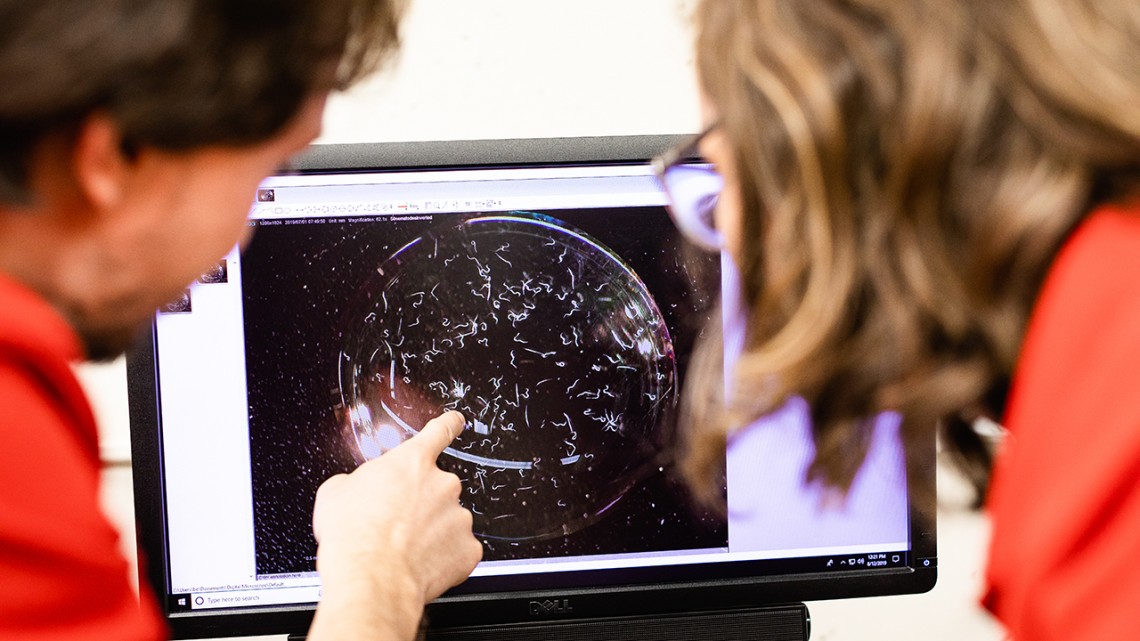
Denis Willet, left, assistant professor of entomology, and research associate Camila Filgueiras examine nematodes under a digital microscope.
Plant parasites cause lasting genetic changes
By Krisy Gashler
When ground-dwelling parasites munch on the roots of plants, they don’t just damage the roots: They trigger chemical changes in the plant itself.
Nematodes – also known as roundworms – exist in almost every environment and survive as parasites on human, animal or plant hosts. Plant-parasitic nematodes can devastate agricultural crops by interfering with roots; the annual economic loss from such pests is estimated at more than $100 billion.
Two Cornell researchers and their colleagues have discovered that the plant-parasitic sting nematode (Belonolaimus longicaudatus Rau) caused changes in the chemical makeup of African bermudagrass. Attacks by the nematodes triggered specific types of plant immunity and changed the plants’ acid and sugar profiles.
The paper, “Sting Nematodes Modify Metabolomic Profiles of Host Plants,” published Feb. 10 in Nature Scientific Reports.
“There’s a very tight co-evolutionary arms race between endoparasitic nematodes, which tend to be very species-specific, and their plant hosts,” said Denis Willett, assistant professor of entomology.
Endoparasites burrow into a plant’s roots and hijack some of the plant’s machinery to feed themselves. Previous research on certain endoparasites demonstrated that as plants evolve to strengthen their defenses, parasites evolve to overcome them, causing a cascade of genetic changes within their plant hosts.
In contrast, ectoparasites – which browse on a plant’s root and then move on – are not as tightly coupled with the plants they attack as endoparasites, and were assumed to cause more limited changes. This new research disproves that assumption.
“These ectoparasites, they’re not as specific — they’ll feed on turfgrass, peanuts, cotton, a variety of plants,” Willett said. “We were interested to see if these sting nematodes, despite being browsers, could also modify the host plants the way endoparasites do — to see if a browser can have similar co-evolutionary properties as an endoparasite.”
They found that the sting nematode does modify its host plant’s chemical makeup in significant ways. For example, in varieties of bermudagrass that are more susceptible to nematode damage, amino acids were suppressed, interfering with photosynthesis and preventing the formation of vegetable tissue.
In bermudagrass varieties that were more resistant to the pests, the researchers saw higher production of defense-related compounds like phenylalanine, which is also crucial to plant structure and reproduction.
“It’s well known that these nematodes cause damage to plants, but relatively little is known about what’s going on inside the plant when that happens,” said Camila Filgueiras, a research associate at Cornell AgriTech in Geneva, New York. Willett and Filgueiras are co-first authors of the paper.
For plant breeders interested in developing crops resistant to such nematodes, the most significant finding from the study was connected to pipecolic acid – an important player in regulating immunity and fighting infections. The researchers discovered that compounds like pipecolic acid were “strongly associated with plants inoculated” against sting nematodes.
“What we saw with pipecolic acid is likely related to a pattern of systemic acquired resistance in the plants,” Willett said, “roughly like what happens in humans when we get a vaccine: We develop antibodies and become resistant to that particular infection in the future. In certain varieties, these nematodes were triggering that type of response.”
In the future, Filgueiras and Willett plan to explore how other environmental factors influence the interplay between nematodes and plants – including whether nematodes can use chemical smells to detect which plants are more or less susceptible to them.
Said Filgueiras: “If we can understand better how the plant responds to these attacks, we can develop more effective technologies and multidisciplinary strategies to help crops be more efficient in the field.”
Other contributors included researchers at the University of Florida and the University of Georgia.
Krisy Gashler is a freelance writer for the College of Agriculture and Life Sciences
Media Contact
Get Cornell news delivered right to your inbox.
Subscribe
